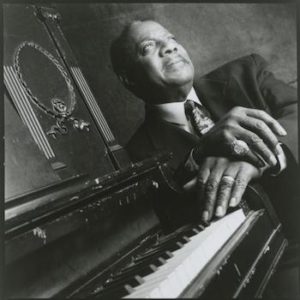
Johnnie Johnson
*The birth of Johnnie Johnson on this date in 1924 is marked on this date. He was a Black musician and composer.
Born in Fairmont, West Virginia, Johnson began playing the piano at the age of 4. By his twenties, he was an accomplished jazz and blues player on the Chicago club circuit, where he had apprenticed under the likes of Muddy Waters and Albert King. A self-taught musician, bandleader, and composer, Johnson composed the riffs for many of Chuck Berry's most famous tunes, including "Maybellene," "Sweet Little Sixteen," and "Rock and Roll Music," which Berry transposed to guitar. Berry wrote his best-known song, "Johnny B. Goode," in tribute to Johnson.
But it was Johnson who gave Berry his first big break. On New Year's Eve in 1952, Johnson was stuck when fronting his trio in St. Louis. His sax player fell ill and needed an emergency replacement, so he called in his pal Berry, a promising young guitarist, to fill in. The show was a hit. Johnson asked Berry to join the band, and soon, the more charismatic Berry was the frontman. Their partnership produced dozens of hit songs before they parted company in 1973. Johnson last performed at the new club 'Finale' in Clayton, Missouri, and a special NCAA Final Four-related concert in St. Louis. Johnson had also been planning to return to his West Virginia hometown to teach a music class later this year.
Wrecked by alcoholism, Johnson fell off the radar. He was driving a bus when Rolling Stones guitarist Keith Richards tracked Johnson down while making the 1987 Berry documentary Hail! Hail! Rock 'n' Roll. Richards, convinced that Johnson should be in the rock pantheon alongside Berry, launched a high-profile campaign to get Johnson into the Rock and Roll Hall of Fame. But Hall rules stipulated that a musician isn't eligible for the Rock Hall until 25 years after his/her first credited album. Richards, in turn, produced Johnson's 1987 Grammy-nominated solo debut album, Blue Hand Johnnie. Johnson re-launched his career, performing and recording with Richards, Eric Clapton, Bob Weir, Buddy Guy, Bonnie Raitt, and Bruce Hornsby.
"Johnson ain't copying Chuck's riffs on piano," Richards once said. "Chuck adapted them to guitar and put those great lyrics behind them. But without somebody to give him those riffs--voila!--no song, just a lot of words on paper." In 2001, Johnson received his Rock and Roll Hall of Fame induction after the institution revised its rules to create a "sideman" category, and it was Richards who performed the induction. It was also Richards who prompted Johnson to sue Berry in 2001. The pianist's federal lawsuit claimed that Berry took advantage of Johnson's alcoholism by claiming sole ownership over the songs and refusing to acknowledge Johnson's role in their compositions. Johnson sought millions of dollars in royalties. However, a federal judge tossed the suit a year later, ruling that too much time had passed before Johnson brought the complaint.
Johnson influenced generations of rockers through his collaborations with Berry--everyone from Elvis Presley and Little Richard to the Beatles and the Rolling Stones. Fellow rock originator Bo Diddley, who performed with Johnson, called him "a great man and a great musician." "It was so much fun to play with Johnnie," Diddley said. "He will be missed, but his music will live on." According to his publicist, Berry was traveling back from Europe and was not immediately available for comment.
Johnnie Johnson, the rhythm-and-blues piano wizard whose pioneering partnership with Berry produced such memorable tracks as "Roll Over Beethoven" and "No Particular Place To Go" and helped to lay the foundations for rock 'n' roll, died on April 13, 2005. He was 80. His wife, Frances, and their ten children, along with numerous grandchildren, survived Johnson.
All Media Guide
1168 Oak Valley Drive
Ann Arbor, MI 48108 USA